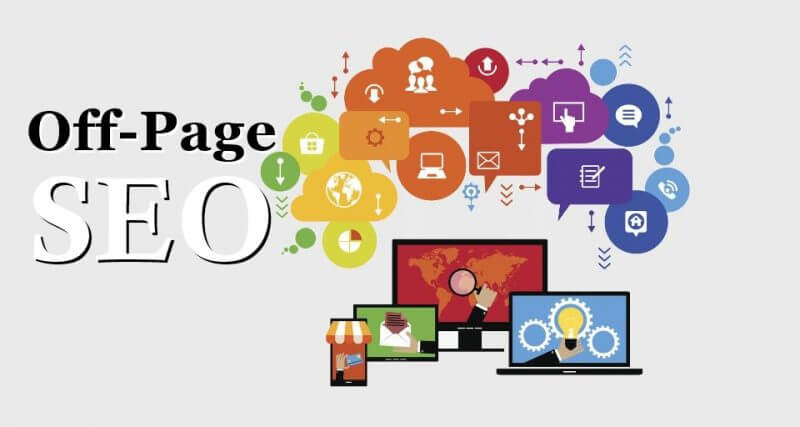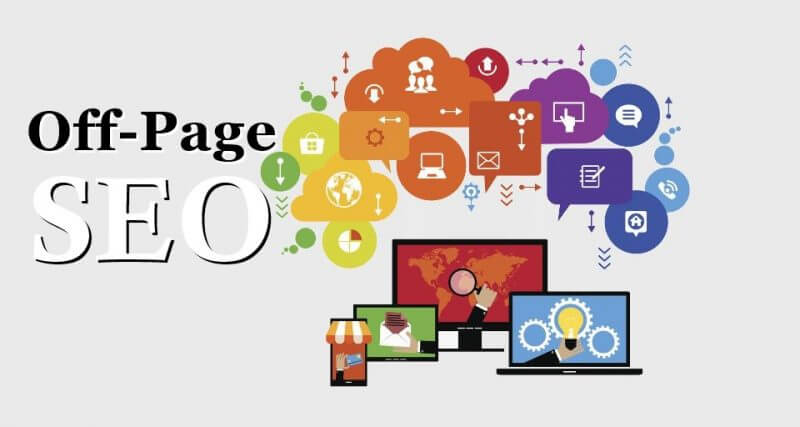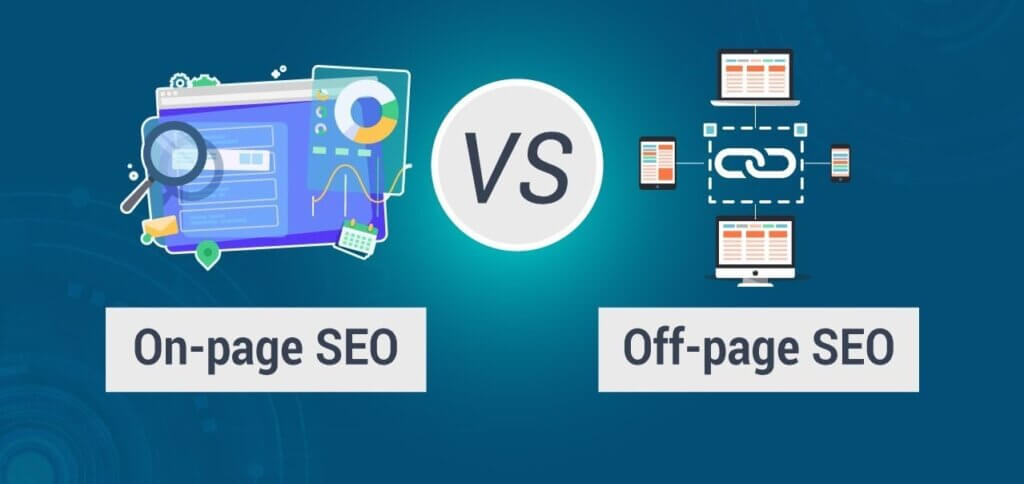Off-Page SEO
Introduction
Off-Page SEO refers to the techniques and strategies used outside a website to improve its search engine rankings. While On-Page SEO focuses on optimizing the content and structure of a website itself, Off-Page SEO is all about creating signals that tell search engines that your website is trustworthy, relevant, and popular.
The Importance of Off-Page SEO:
Off-Page SEO is essential for any website that wants to rank well in search engine results pages (SERPs). Here are some of the reasons why:
- Backlinks – A significant component of Off-Page SEO is building high-quality backlinks from other websites. Backlinks are essentially votes of confidence from other sites that your content is valuable and trustworthy. The more backlinks a website has from reputable sources, the more likely it is to rank well in search results.
- Social Signals – Social media platforms like Facebook, Twitter, and LinkedIn can provide valuable signals to search engines about the relevance and popularity of a website. Shares, likes, and comments can all contribute to a website’s Off-Page SEO and improve its search engine rankings.
- Brand Awareness – Off-Page SEO can also help to increase brand awareness and credibility. When a website is mentioned on other sites or social media platforms, it can help to build trust and recognition among potential customers.
- Competitive Advantage – Strong Off-Page SEO can give a website a competitive advantage over other sites in the same niche. A website can outrank its competitors in search results and attract more traffic and customers by building a solid backlink profile and social media presence.
Link building
Link building is an essential aspect of Off-Page SEO. It involves acquiring backlinks to a website from other websites to improve its search engine rankings. Backlinks are crucial because they signal to search engines that your website is a reputable and trustworthy source of information. This article will explore some critical aspects of link building and provide tips for building a solid backlink profile.
Types of Backlinks:
Not all backlinks are created equal. Here are some common types of backlinks and how they can impact your Off-Page SEO efforts:
- Editorial Links – These links are included in a website’s editorial team’s content. Editorial links are often considered the most valuable type of backlink because they are typically from high-quality sources.
- Guest Post Links – Guest blogging is a popular link-building strategy where a website owner writes a blog post for another website in exchange for a backlink. While guest post links can be effective, focusing on high-quality sites and avoiding spammy or low-quality sites is essential.
- Directory Links – Directory links are acquired by submitting a website to online directories. While directory links can provide some value, they are generally considered less valuable than other links.
- Forum Links – Forum links are acquired by participating in online forums and including links to your website in your signature or forum posts. While forum links can be effective in specific niches, they are often considered low-quality.
Strategies for Link Building:
There are many different strategies for building backlinks. Here are some key strategies to consider:
- Create High-Quality Content – One of the best ways to build high-quality backlinks is to create content people want to link to. By producing informative, engaging, and shareable content, you can increase the chances that other websites will link to your content.
- Reach Out to Websites – Another effective link-building strategy is to reach out to other websites in your niche and ask them to link to your content. This can be done through email, social media, or a tool such as BuzzStream or NinjaOutreach.
- Use Broken Link Building – Broken link building involves finding broken links on other websites and offering to replace them with links to your content. This strategy can be effective because it provides value to the website owner by helping them to fix broken links.
- Participate in Guest Blogging – Guest blogging involves writing a blog post for another website in exchange for a backlink. This strategy can be effective because it allows you to reach a new audience while building high-quality backlinks.
Link Building Tools:
There are many tools available to help with link building. Here are some popular link-building tools to consider:
- Ahrefs – Ahrefs is a popular tool for analyzing backlinks and identifying new link-building opportunities.
- SEMrush – SEMrush is a comprehensive SEO tool with a backlink analysis feature.
- Moz Link Explorer – Moz Link Explorer is a tool that provides an in-depth analysis of backlinks and can help to identify new link-building opportunities.
- Pitchbox – Pitchbox is a tool that can help with outreach and link building by automating many tasks associated with reaching out to websites.
Link building is a critical aspect of Off-Page SEO. By focusing on high-quality backlinks, implementing effective link-building strategies, and utilizing the right tools, you can build a strong backlink profile that will help to improve your search engine rankings and drive more traffic to your website.
Social media marketing
Social media marketing is an essential aspect of Off-Page SEO that can help to increase brand awareness, drive traffic to your website, and provide valuable social signals to search engines. This article will explore some key aspects of social media marketing and provide tips for building a solid social media presence.
Importance of Social Media for SEO:
Social media can significantly impact your website’s search engine rankings. Here are some of the ways that social media can benefit your SEO efforts:
- Brand Awareness – Social media can help to increase brand awareness and recognition by providing a platform for promoting your brand and engaging with your audience.
- Social Signals – Social signals such as likes, shares, and comments can provide valuable signals to search engines about the relevance and popularity of your content.
- Backlinks – Social media can also help generate backlinks to your website, improving your search engine rankings.
Social Media Platforms for SEO:
Many different social media platforms can be used to improve your website’s Off-Page SEO. Here are some popular platforms to consider:
- Facebook – Facebook is one of the largest social media platforms and can be an effective tool for building brand awareness, driving traffic to your website, and engaging with your audience.
- Twitter – Twitter is a fast-paced platform that can be used to share updates, promote your content, and engage with your audience.
- LinkedIn – LinkedIn is a professional networking platform that can be used to build relationships with other professionals in your industry and promote your brand.
- Instagram – Instagram is a visual platform that can showcase your products or services and engage your audience through visual content.
Social Media Management Tools:
Managing a solid social media presence can be time-consuming, so using the right tools to streamline your efforts is essential. Here are some popular social media management tools to consider:
- Hootsuite – Hootsuite is a comprehensive social media management tool that allows you to schedule posts, monitor your brand, and analyze your social media performance.
- Buffer – Buffer is a social media scheduling tool allowing you to schedule posts for multiple social media platforms simultaneously.
- Sprout Social – Sprout Social is a social media management tool with scheduling, analytics, and team collaboration features.
- Agorapulse – Agorapulse is a social media management tool with scheduling, analytics, and social listening features.
Social Media Strategies for SEO:
Here are some effective strategies for using social media to improve your website’s Off-Page SEO:
- Share Your Content – One of the best ways to use social media for SEO is to share your content on social media platforms. Promoting your content on social media can increase its visibility and attract more traffic to your website.
- Engage with Your Audience – Engaging with your audience on social media can help to build brand awareness, increase loyalty, and generate valuable social signals.
- Collaborate with Other Brands – Collaborating with other brands or influencers in your industry can help to increase your reach and attract new followers.
- Use Hashtags – Hashtags can be used to increase the visibility of your social media posts and attract more followers.
Social media marketing is a powerful tool for improving your website’s Off-Page SEO. Using the right platforms, tools, and strategies, you can build a solid social media presence that will help increase brand awareness, drive traffic to your website, and improve your search engine rankings.
Content Marketing
Content marketing is a powerful strategy for improving your website’s Off-Page SEO. Creating high-quality, engaging content that attracts links and shares can build a strong backlink profile and increase your website’s visibility in search engine results pages (SERPs). This article will explore some key aspects of content marketing and provide tips for creating an effective content marketing strategy.
Importance of Content Marketing for SEO:
Content marketing can have a significant impact on your website’s Off-Page SEO. Here are some of the ways that content marketing can benefit your SEO efforts:
- Backlinks – High-quality content can attract links from other websites, improving your website’s authority and search engine rankings.
- Social Signals – Engaging, shareable content can generate valuable social signals like likes, shares, and comments, contributing to your website’s Off-Page SEO.
- Brand Awareness – Content marketing can help to increase brand awareness and recognition by providing a platform for promoting your brand and engaging with your audience.
Types of Content Marketing:
Many different types of content marketing can improve your website’s Off-Page SEO. Here are some popular types of content marketing to consider:
- Blog Posts – Blog posts are a popular form of content marketing that can provide valuable information to your audience, attract links and social shares, and improve your website’s search engine rankings.
- Infographics – Infographics are visual representations of data that can be used to convey complex information in a visually appealing way. Infographics can be highly shareable and can generate valuable backlinks.
- Videos – Videos are a popular form of content marketing that can be used to provide engaging and shareable content to your audience. Videos can also generate valuable backlinks and social signals.
- Whitepapers and Ebooks – Whitepapers and ebooks are longer-form content pieces that can provide valuable information to your audience and generate high-quality backlinks.
Content Marketing Tools:
Creating and promoting content can be time-consuming, so using the right tools to streamline your efforts is essential. Here are some popular content marketing tools to consider:
- BuzzSumo – BuzzSumo is a tool that can be used to identify popular content in your industry and analyze social media engagement.
- Canva – Canva is a graphic design tool that can be used to create visually appealing content, such as infographics and social media graphics.
- Grammarly is a writing assistant tool that can help improve your content’s quality and readability.
- Hootsuite – Hootsuite is a social media management tool that can schedule and promote your content on social media.
Content Marketing Strategies for SEO:
Here are some effective strategies for using content marketing to improve your website’s Off-Page SEO:
- Conduct Keyword Research – Keyword research can help you identify topics relevant to your audience and have a high search volume.
- Create High-Quality Content – High-quality, engaging content is essential for attracting backlinks and social shares. Focus on creating content that provides value to your audience and is highly shareable.
- Promote Your Content – Promoting your content through social media and other channels can help to increase its visibility and attract backlinks and social shares.
- Monitor Your Performance – Monitoring your content’s performance can help you identify what types of content resonate with your audience and adjust your strategy accordingly.
Content marketing is an essential aspect of Off-Page SEO. Creating high-quality, engaging content and using the right tools and strategies to promote it can improve your website’s search engine rankings and attract more traffic.
Local SEO
Local SEO is a critical aspect of Off-Page SEO for businesses that rely on local customers. Optimizing your website and online presence for local search can improve your visibility in local search results and attract more customers to your area. This article will explore some key aspects of local SEO and provide tips for optimizing your website for local search.
Importance of Local SEO:
Local SEO is essential for businesses that serve customers in a specific geographic area. Here are some of the ways that local SEO can benefit your business:
- Increased Visibility – Optimizing your website and online presence for local search can increase your visibility in local search results and attract more local customers.
- Higher Conversions – Local SEO can lead to higher conversions because it targets customers actively searching for your products or services in your area.
- Competitive Advantage – Optimizing your website for local search allows you to gain a competitive advantage over other businesses that are not optimized for local search.
Local SEO Strategies:
Here are some effective strategies for optimizing your website for local search:
- Claim and Optimize Your Google My Business Listing – Google My Business is a free tool that allows businesses to manage their online presence on Google. By claiming and optimizing your Google My Business listing, you can increase your visibility in local search results and attract more local customers.
- Use Local Keywords – Incorporating local keywords into your website content can help to improve your visibility in local search results. Focus on using keywords relevant to your business and your geographic area.
- Build Local Citations – A citation mentions your business’s name, address, and phone number (NAP) on another website. Building local sources on reputable websites can help to improve your visibility in local search results.
- Optimize Your Website for Mobile – More and more customers are using mobile devices to search for local businesses. Optimizing your website for mobile can improve your visibility in local search results and provide a better user experience.
Local SEO Tools:
Here are some popular local SEO tools to consider:
- Google My Business – Google, My Business, is a free tool that allows businesses to manage their online presence on Google.
- Moz Local – Moz Local is a tool to manage local citations and improve your visibility in local search results.
- BrightLocal – BrightLocal is a comprehensive local SEO tool with features for local search ranking, citation management, and review monitoring.
- SEMrush – SEMrush is a comprehensive SEO tool with a local SEO feature for managing your business’s online presence and monitoring your local search rankings.
Local SEO is an essential aspect of Off-Page SEO for businesses that serve local customers. Optimizing your website and online presence for local search can increase your visibility in local search results and attract more local customers. Using the right strategies and tools, you can improve your website’s search engine rankings and gain a competitive advantage over other businesses in your area.
Online Reputation Management
Online reputation management is an essential aspect of Off-Page SEO that involves monitoring and managing your brand’s online reputation. By actively monitoring your online presence and responding to customer feedback, you can improve your brand’s reputation, attract more customers, and improve your search engine rankings. This article will explore some key aspects of online reputation management and provide tips for managing your brand’s online reputation.
Importance of Online Reputation Management:
Online reputation management is essential for businesses of all sizes. Here are some of the ways that online reputation management can benefit your brand:
- Increased Credibility – By actively managing your online reputation, you can establish your brand as a credible and trustworthy source of information.
- Improved Customer Relations – By responding to customer feedback, you can improve customer relationships and increase their loyalty to your brand.
- Higher Search Engine Rankings – Positive online reviews and feedback can improve your search engine rankings and increase your visibility in search results.
Online Reputation Management Strategies:
Here are some effective strategies for managing your brand’s online reputation:
- Monitor Your Online Presence – Regularly monitoring your brand’s online presence is essential for managing your online reputation. Use tools such as Google Alerts and social media monitoring tools to track mentions of your brand online.
- Respond to Feedback – Responding to customer feedback is an integral part of online reputation management. Responding promptly and professionally to negative feedback can help to improve your brand’s reputation and show customers that you care about their concerns.
- Encourage Positive Reviews – Encouraging customers to leave positive reviews on review sites such as Yelp and Google My Business can help to improve your online reputation and increase your visibility in search results.
- Address Negative Reviews – Addressing negative reviews promptly and professionally can help to mitigate the damage to your brand’s reputation. Responding publicly to negative reviews shows you are committed to addressing customer concerns and improving your brand’s reputation.
Online Reputation Management Tools:
Here are some popular online reputation management tools to consider:
- Google Alerts – Google Alerts is a free tool that allows you to monitor mentions of your brand online.
- Hootsuite Insights – Hootsuite Insights is a tool that can help you monitor your brand’s social media mentions.
- Brand24 – Brand24 is a social media monitoring tool that monitors your brand’s online reputation.
- Reputation.com – Reputation.com is a comprehensive online reputation management tool with features for monitoring online reviews, responding to feedback, and improving your online reputation.
Online reputation management is an essential aspect of Off-Page SEO. By actively monitoring your brand’s online presence and responding to customer feedback, you can improve your brand’s reputation, attract more customers, and improve your search engine rankings. By using the right strategies and tools, you can manage your online reputation effectively and establish your brand as a credible and trustworthy source of information.
Conclusion
Off-Page SEO is a critical aspect of any comprehensive off-page SEO strategy. Focusing on Off-Page SEO can improve your website’s search engine rankings, increase your visibility in search results, and attract more traffic. Here are some key takeaways from this article:
- Link building is an essential aspect of Off-Page SEO. By generating high-quality backlinks to your website, you can improve your website’s authority and search engine rankings.
- Social media marketing is another essential component of Off-Page SEO. Building a solid social media presence can increase brand awareness, drive traffic to your website, and provide valuable social signals to search engines.
- Content marketing can also be used to improve your website’s Off-Page SEO. Creating high-quality, engaging content and promoting it effectively can attract backlinks and social shares, enhancing your website’s authority and search engine rankings.
- Local SEO and online reputation management are two additional aspects of Off-Page SEO that are important for businesses that serve local customers. Optimizing your website for local search and managing your brand’s online reputation can improve your visibility in search results and attract more local customers.
Off-Page SEO is a multifaceted approach to improving your website’s search engine rankings and attracting more traffic. Using the right strategies and tools, you can build a robust Off-Page SEO presence to help you achieve your business goals and stay competitive in today’s digital landscape.
F.A.Q
What are examples of off-page SEO?
Examples of Off-Page SEO include:
- Link Building – Generating high-quality backlinks to your website from other reputable websites.
- Social Media Marketing – Building a solid presence and using social media to promote your website and content.
- Content Marketing – Creating high-quality, engaging content that attracts links and shares from other websites.
- Local SEO – Optimizing your website for local search and building a solid online presence in your local area.
- Online Reputation Management – Monitoring and managing your brand’s online reputation to improve your credibility and trustworthiness in the eyes of search engines and potential customers.
These are just a few examples of Off-Page SEO strategies businesses can use to improve their website’s search engine rankings and attract more traffic.
What is off-page vs. on-page SEO?
Off-Page SEO and On-Page SEO are two critical components of Search Engine Optimization (SEO). While On-Page SEO refers to optimizing elements on your website to improve its search engine rankings, Off-Page SEO refers to activities outside your website that can impact its rankings.
On-Page SEO includes optimizing title tags, meta descriptions, header tags, and content on your website, as well as optimizing your website’s structure and technical aspects such as site speed and mobile-friendliness. On-Page SEO is important because it helps search engines understand the content and design of your website, which can improve its visibility in search engine results pages (SERPs).
On the other hand, Off-Page SEO includes link building, social media marketing, content marketing, local SEO, and online reputation management. These activities take place outside of your website. They can impact its search engine rankings by increasing its authority, relevance, and trustworthiness in the eyes of search engines and potential customers.
On-Page SEO and Off-Page SEO are essential for improving your website’s search engine rankings and attracting more traffic. While On-Page SEO focuses on optimizing elements on your website, Off-Page SEO focuses on building your website’s reputation and authority through external activities. To achieve the best results, a well-rounded SEO strategy should include On-Page and Off-Page SEO.
Is off-page SEO still effective for SEO?
Yes, Off-Page SEO is still an effective strategy for improving a website’s search engine rankings. While the importance of specific Off-Page SEO techniques may vary over time, building a solid online presence outside your website remains a critical component of a comprehensive SEO strategy.
Link building, social media marketing, content marketing, local SEO, and online reputation management are examples of Off-Page SEO techniques that can still significantly impact a website’s search engine rankings. By building a solid backlink profile, promoting your brand through social media and content marketing, optimizing your website for local search, and managing your online reputation, you can improve your website’s authority, relevance, and trustworthiness in the eyes of search engines and potential customers.
It’s important to note that Off-Page SEO should be used with On-Page SEO techniques for the best results. On-Page SEO focuses on optimizing elements on your website, while Off-Page SEO focuses on building your website’s reputation and authority through external activities. To achieve the best results, a well-rounded SEO strategy should include On-Page and Off-Page SEO.






